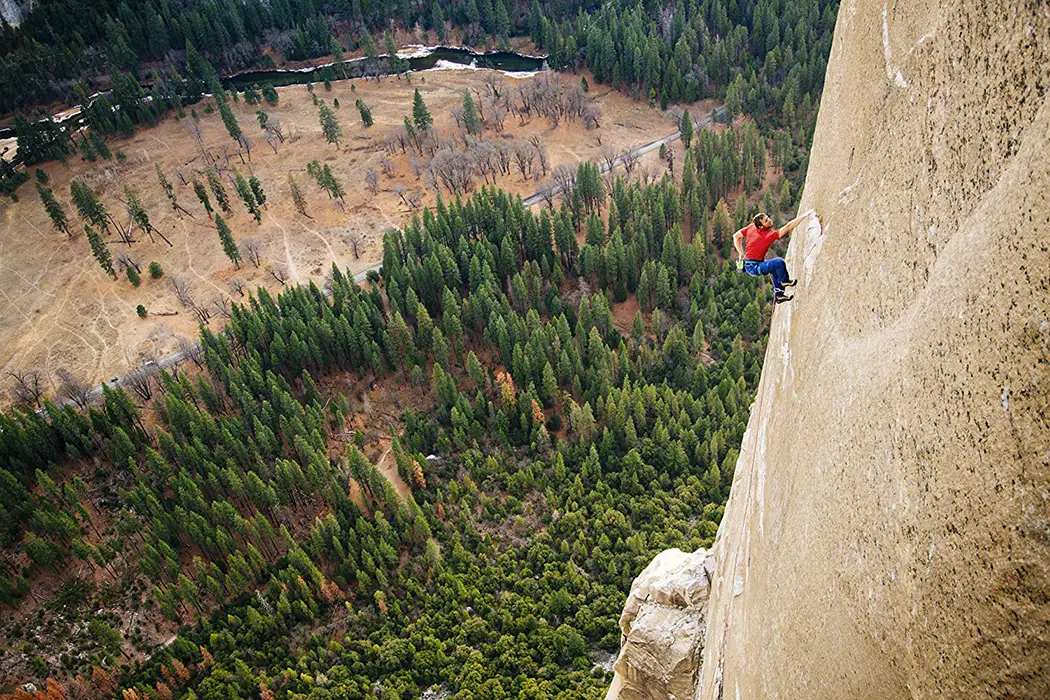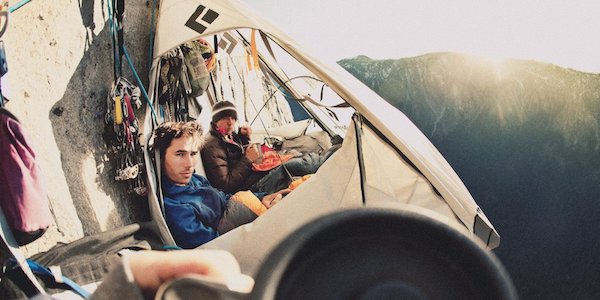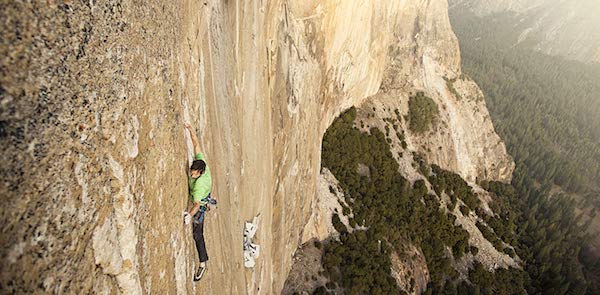THE DAWN WALL: Doing The Impossible

Eric D. Bernasek lives on the island just north of…
It’s January 4, 2015. Tommy Caldwell and Kevin Jorgeson are sitting on two portaledges, tented platforms with barely a body’s length of space to stretch out on, suspended by ropes at roughly 1,200 feet above the ground. That’s just over one third of their way up the “Dawn Wall,” the most prominent portion of the eastern face of Yosemite’s iconic peak, El Capitan. Caldwell and Jorgeson are nine days into their planned two-week attempt to complete the first continuous free climb of this 3,000 foot expanse of largely smooth and completely vertical granite, and John Branch of the New York Times is on the phone with one very obvious question: Why?
Cinematographer Brett Lowell was there too, and now directors Josh Lowell and Peter Mortimer have created The Dawn Wall to tell the story of Caldwell and Jorgeson’s historic effort and to answer Branch’s question. However monumental, those may seem like straightforward tasks. And from a distance, maybe they are. But up close, things are a lot more complicated.
Josh Lowell is the founder of Big UP Productions, and Peter Mortimer (with Nick Rosen) is behind the production company Sender Films. Since 2006, the two companies have been behind the annual REEL ROCK film tour, a traveling film festival dedicated to the world of sport climbing. Both directors have created impressive lists of short and long-format films about climbing, including the feature-length documentary Valley Uprising (now on Netflix in the US and Canada) about rock climbing’s colorful history at Yosemite. Though that film attempted to attract interest outside of the specialized community of climbers whose stories Lowell and Mortimer chronicle so ardently, The Dawn Wall is, even more so, clearly devoted to bringing the widest possible audience along for the adventure.
That it might succeed in doing so while seamlessly expanding viewers’ knowledge and appreciation of the sport, without trivializing or sensationalizing anything, would be in itself no small feat. Whether or not the audience comes along, the filmmakers have succeeded – The Dawn Wall is a near-perfect documentary that tells an extraordinary story exceptionally well.
A Good Story
A good story and good storytelling aren’t necessarily the same thing. A good story relies on good content – are the events in the narrative and the characters who participate in it interesting enough to capture attention? In this case, the facts of the story are preternaturally compelling.

As origin stories go, Tommy Caldwell’s seems readymade for a narrative like this one, which is all about facing difficulties and overcoming obstacles. Caldwell started life “fragile” and struggled with developmental delays, but thanks mostly to his father soon found a taste for challenge in general and a deep affinity for climbing in particular. Tommy went quickly from climbing prodigy to overnight success, almost accidentally, and a few short years later found himself halfway across the world with the love of his life caught in the middle of a life-or-death confrontation with Islamist insurgents. The next few years brought further setbacks, more commonplace but no less consequential, including the loss of an index finger, which you’d be forgiven for thinking should have ended Caldwell’s career.
Kevin Jorgeson’s backstory is not nearly as dramatic as is his counterpart’s. When he joins Caldwell’s quest to master the Dawn Wall, Jorgeson is a self-admitted “newb” in the world of big wall free climbing, having focused his efforts up to that point on bouldering, a type of climbing that’s done without ropes or harnesses on rock formations that typically don’t rise higher than 20 or 30 feet. That mix of demonstrated skill but relative inexperience helps to create one of the most significant, and riveting, sequences of the film.
Good Storytelling
So the story is clearly a good one, virtually overstuffed with absorbing details. But good storytelling is all about what gets done with those details – what gets included? What gets left out? In what order are events presented? Why? And, of particular interest here, how are all these elements employed in service to emotion?

This is where The Dawn Wall exceeds expectations. Instead of resting comfortably on the foundation of a good story, Peter Mortimer and Josh Lowell (who also, crucially, edited the film) dig deep and turn out a truly phenomenal narrative by following the emotional rather than the chronological arc of the events. The Dawn Wall is focused on its story’s emotional core to a degree that very few documentaries match. And though viewers may ultimately be unable to relate to Caldwell and Jorgeson’s desire for the feat itself, and though they may find the reasons why practically incomprehensible, the narrative succeeds because the emotions that underpin it are so intensely familiar.
The Dawn Wall: Not Why, But What, And How
The question isn’t really why? Why were Tommy Caldwell and Kevin Jorgeson – despite extraordinary hardship and risk of death, after years of preparation, past failure, and the consensus view that their goal was entirely impossible – so determined to climb the Dawn Wall? In the end, the questions that their story asks are far more relatable. What do we do when life itself seems impossible? And how do we find a way to go on when we have every reason not to?
One of Caldwell’s friends provides a sort of answer: “If you’re heartbroken, just throw yourself at an impossible wall.” But Jorgeson arrives at something less poetic, approaching practical, by suggesting that sometimes in order to arrive at all’s well, things must end well, meaning that we simply “have to do the hardest thing [we’ve] ever done.” The Dawn Wall may not (or may) inspire you to climb mountains, but it will leave you inspired.
What movies inspire you?
The Dawn Wall premiered in the US on September 19, 2018 and will show in select theaters nationwide starting on October 8, 2018. For more information about screenings in the US and elsewhere, click here.
https://www.youtube.com/watch?v=5Hc8tB9uhho
Does content like this matter to you?
Become a Member and support film journalism. Unlock access to all of Film Inquiry`s great articles. Join a community of like-minded readers who are passionate about cinema - get access to our private members Network, give back to independent filmmakers, and more.
Eric D. Bernasek lives on the island just north of the island that is Montreal. He thinks too much and writes too little. He is currently working on a book about movies from your childhood: "Does Barry Manilow know that you raid his wardrobe?" – Authority and Rebellion in Movies About High School.













